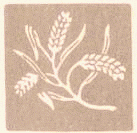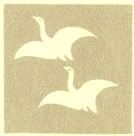| |||||
|
| Reservations | Contents |
|
Haiku of Critic and Poet Masaoka Shiki Masaoka Shiki (1867-1902) was born in a Samurai family, and maintained a prominent position in the literary world despite tuberculosis. He often wrote about it. In 1892 Shiki began to feel it was needed to free poetry from centuries-old rules prescribing topics and vocabulary. In an essa in the newspaper Nihon in 1900, he introduced the word shasei ("delineation from nature") to describe his stance: a poet should present things as they really are, and write in the language of contemporary speech. His articles stimulated renewed interest in the haiku poet Buson. Haiku by ShikiWhile I turned my headthat traveler I'd just passed . . . Melted into mist
After killing
So enviable . . .
A mountain village
The summer river:
Hanging the lantern
Green shadow-dances . . .
For a cool evening
Now my loneliness
Long the summer day . . .
Fireworks ended
By that fallen house
Oh! I ate them all
Autumn mosquitoes
Such a little child
Eleven brave knights
I gave the greetings
At our last parting
Oh sorry tom-cat
Haiku of Others Winter rain deepens
Winter rain deepenslichened letters on the grave . . . And my old sadness – Roka
Roaring winter storm – Gonsui
But when I halted – Kito
Now in late autumn – Taigi
None broke the silence . . . – Ryota
Flower in the stream – Onitsura
Dirty bath-water – Onitsura
Night is bright with stars – Etsujin
You stupid scarecrow! – Yayu
In the farther field – Sanin
One fallen flower – Moritake
Come come! Come out! – Kikaku
Ah! Brave dragon-fly . . . – Kohyo
Many solemn nights – Teitoku
Death-song: – Anon. |
|
Beilenson, Peter, tr. Japanese Haiku. New York: Peter Pauper Press, 1955. Blyth, Reginald Horace. Haiku. Vol 1: Eastern Culture, Tokyo: The Hokuseido Press, 1949. Blyth, Reginald Horace. Haiku. Vol 2: Spring, Tokyo: The Hokuseido Press, 1950. Blyth, Reginald Horace. Haiku. Vol 3: Summer - Autumn. Tokyo: The Hokuseido Press, 1952. Blyth, Reginald Horace. Haiku. Vol 4: Autumn - Winter. Tokyo: The Hokuseido Press, 1952. Bownas, Geoffrey, and Anthony Thwaite. Japanese Verse. Rev. ed. London: Penguin Classics, 2009. Dørumsgaard, Arne. De sorte svalene: Moderne japansk poesi. Første samling. Meiji-perioden (1868-1912). Oslo: Dreyer, 1967, ⍽▢⍽ Arne Dørumsgaard introduces Shiki and tells from the changes in Japanese culture during Shiki's life. Ten haiku by Shiki are included among many others. Hakutaini, Yoshinobu. Haiku and Modernist Poetics. New York: Palgrave MacMillan, 2009. Haugen, Paal-Helge. Blad frå ein austleg hage: hundre Haiku-dikt (Leaves from an Eastern Garden: A Hundred Haiku). Oslo: Det norske Samlaget, 1965. Isaacson, Helen Shikego, comp, tr. 300 Haiku Works. Part 8. Winchester, VA: The Haiku Foundation, 2010. ⍽▢⍽ Haiku of the Shiki School. The work originates in the University of Groningen's Haiku Project Data Base. Rosenstock, Gabriel. Haiku: The Gentle Art of Disappearing. Newcastle upon Tyne: Cambridge Scholars Publishing, 2009.
Sher, Gail. The Haiku Masters: Four Poetic Diaries. Emeryville, CA: Night Crane Press, 2008.
|
| Section | Set |
 |
User's Guide ᴥ Disclaimer © 1996–2018, Tormod Kinnes, MPhil [Email] |